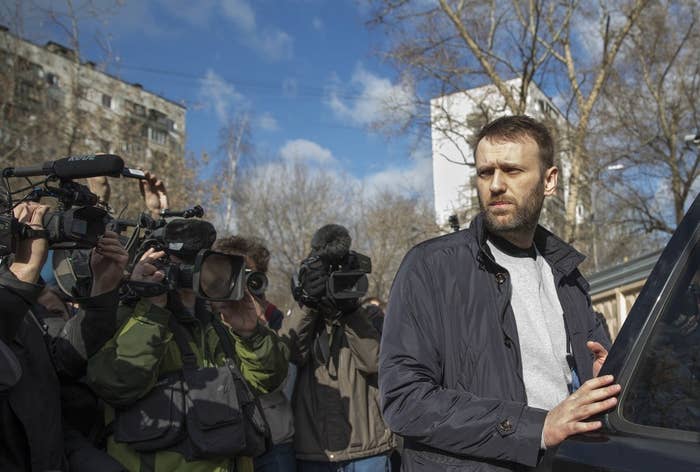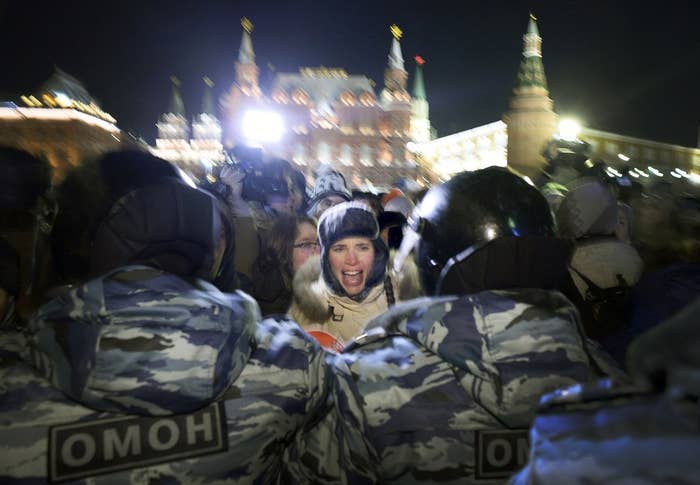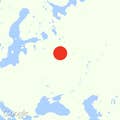
MOSCOW — When a court conveniently jailed Russian opposition leader Alexey Navalny a month ago, it was just long enough for him to miss the protest march he was promoting in Moscow's metro and it looked like the Kremlin was up to its old tricks. After mass protests against Vladimir Putin in 2011-12 triggered a crackdown against critics and the war in Ukraine sent his approval ratings through the roof, there barely seemed any need to persecute opposition leaders properly anymore. Navalny's march looked destined to flop; only one other top organizer, former deputy prime minister Boris Nemtsov, had even bothered to hand out flyers with him.
By the time Navalny left jail two weeks later, Nemtsov had been shot dead just outside the Kremlin, and the planned demonstration became a funereal procession. Today, Russia's opposition looks further away from unseating Putin than ever, reduced to accusing him of ordering Nemtsov's murder but fully aware of its powerlessness to do anything about it.
"It's obvious that the only plan the Kremlin has for us is destruction," Navalny told BuzzFeed News in an interview in his Moscow office on Thursday. "The mood has gotten worse. That was the goal. To intimidate us and spread more fear."
A charismatic 37-year-old lawyer who rose to stardom exposing staggering corruption on his blog before leading the protests three years ago, Navalny is trying to unseat Putin at a time when Russians have less appetite for it than any time under the popular president's 15-year rule. Dissenting voices like Navalny's and Nemtsov's are routinely lambasted on state TV and marginalized elsewhere. The prosperous urban middle class that protested against Putin's return has largely chosen despondent apathy or emigration to the West over more street politics.
The loss of Nemtsov, Navalny says, makes the task of fashioning a powerful opposition movement more difficult than ever. "We didn't realize how important he was until we lost him," Navalny said. "He was a really unique person — he was from the establishment, but he behaved like an activist. Nobody values it when an ordinary political activist hands out flyers and writes reports, but when someone who was this close to the presidency does it, it carries that much more weight."
For Navalny, Nemtsov's sudden death and suspicions surrounding the investigation mark a turning point in Putin's efforts to hold onto power. Previously, figures like Nemtsov — who opposed the government but retained connections to the Russian elite — were seen as untouchable. Nemtsov, a former deputy prime minister, was once considered the favorite to succeed Boris Yeltsin as Russia's president in the 1990s and had even assigned Putin a government apartment when the latter moved to Moscow to run the security services. Two days before his death, Nemtsov visited Navalny in jail, where the two discussed how his status "in the system" allowed him to forego bodyguards or so much as worry about state persecution.
The war in Ukraine brought Putin sky-high popularity at home, but then helped provoke the biggest economic crisis in Russia in years. "Putin's main lever of control was never intimidation, it was buying people off," Navalny told BuzzFeed News. "There are fewer possibilities to buy people off, so he compensates with intimidation."

Russia's harsh new political climate, however, has yet to produce a split in the governing elite of the sort Navalny has long called for. Instead, Russia's establishment has coalesced around the man Navalny says wants to be "emperor for life and the sole face of Russian power." He ascribes part of the blame to what he says is misguided Western sanctions policy. U.S. and EU leaders have focused on broad-based measures targeting Russia's economy and personal sanctions against players in the war in Ukraine.
Instead, Navalny says the most effective measure would be a mass blacklist of the entire Russian political elite. Several oligarchs and bosses at state-run media outlets have pleaded Western governments to keep them off the sanctions list, U.S. officials say. Navalny wants them to be punished collectively until they overthrow Putin in a palace coup.
"The basic compromise that Putin made with the elite has been violated — they could get as rich as they wanted in exchange for letting him take all the power," he said. "Since they don't like what he's doing in Ukraine and what's happening with sanctions, they all start whispering among themselves, 'Putin's totally lost it, what an idiot.' That's more dangerous than any opposition."
At the same time, Navalny's hope for a putsch inspired by the pain of Western sanctions is itself a tacit admission that the opposition is essentially powerless. Putin has come to dominate the Russian political sphere so much that there is essentially no space for any other figures at all, to say nothing of an alternative. A recent poll by the Levada Center, an independent pollster, found Navalny's support was only at 1%. That put him at the same level, however, as defense minister Sergei Shoigu — considered a potential Putin successor in the rare moments when the subject comes up — and actually ahead of Prime Minister Dmitry Medvedev, who kept Putin's presidency warm for four years until 2012.
For now, Navalny is resigned to the tactics that saw him rise to the mantle of challenger that year, but proved powerless against a revanchist Kremlin. Finding money is increasingly difficult. All the major donors to his Foundation for Fighting Corruption have backed out under government pressure; Vladimir Ashurkov, his right-hand man and fundraiser, fled to London seeking political asylum after authorities opened an investigation against him.
Russia's internet crackdown, too, has made it far more difficult for him to find an audience: His blog is frequently blocked by authorities, while several independent outlets who gave his anti-corruption investigations publicity are now under pro-Kremlin management. So, too, has the government's refusal to allow his political outfit, the Progress Party, to field candidates at elections.
Navalny insists that trying to win the fair way will eventually help turn Russians against Putin's government. "People understand a lot more about what's going on when you explain to them that there's a direct link between the milk price going up and the war in Ukraine," he said. But he is under no illusions about the challenges he faces.
"If before we were demanding honest elections, now we're just demanding to have elections at all," he said. "Our politics has been reduced to the most primitive form possible. What can we do apart from protests and handing out leaflets?"

